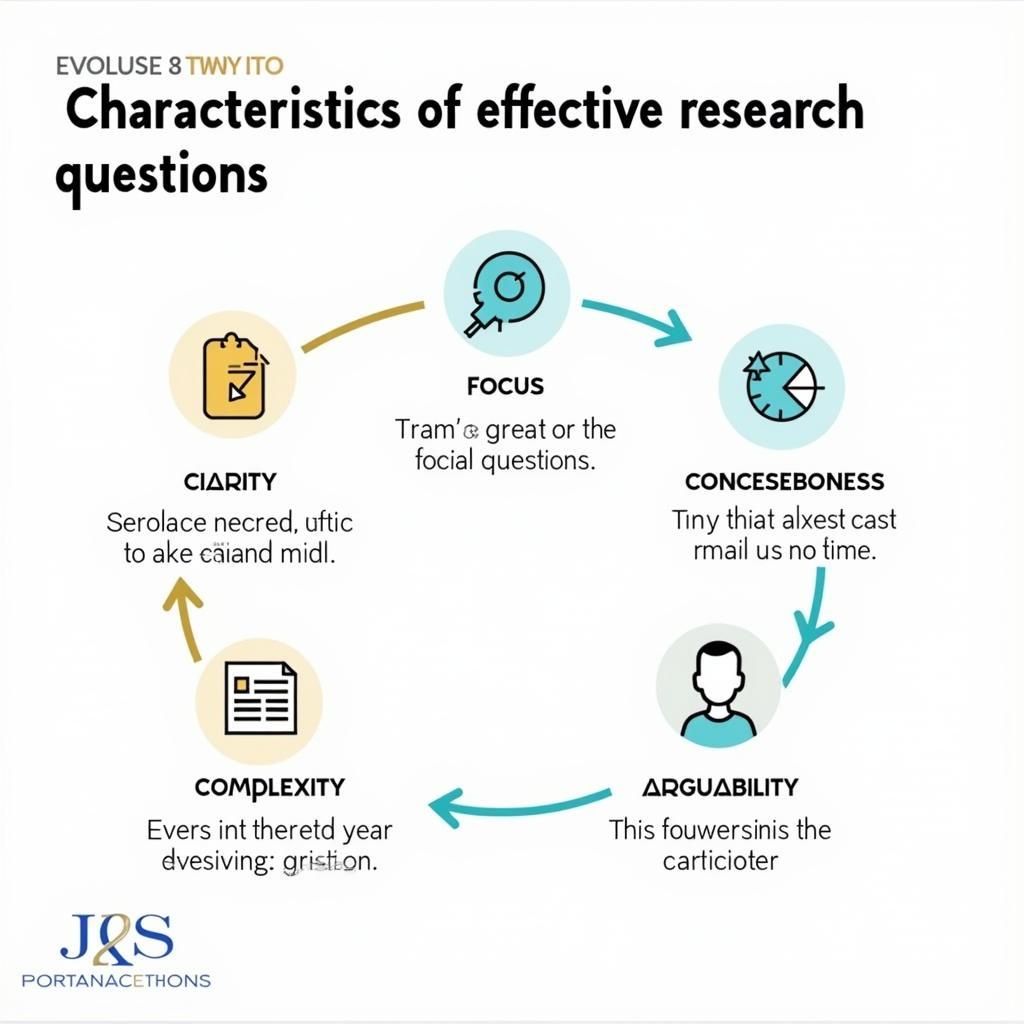Good Research Question Examples are essential for any successful investigation, whether you’re exploring the mysteries of the paranormal or delving into scientific inquiry. A well-crafted question sets the stage for your entire research process, guiding your exploration and ultimately shaping your findings. This article will delve into the art of formulating effective research questions, providing you with practical good research question examples and insights to refine your investigative approach. examples of good and bad research questions
Defining a “Good” Research Question
What exactly makes a research question “good”? A good research question is clear, focused, concise, complex, and arguable. It should be specific enough to guide your research but open-ended enough to allow for exploration and discovery. It’s the compass that points you towards meaningful answers.
Characteristics of Effective Research Questions
- Clarity: The question should be easily understood and free of jargon.
- Focus: It should address a specific aspect of your research topic, avoiding broad generalizations.
- Conciseness: A good research question is succinct and to the point, avoiding unnecessary wording.
- Complexity: It should delve beyond simple yes/no answers and encourage in-depth analysis.
- Arguable: The question should allow for different perspectives and interpretations, fostering debate and critical thinking.
 Characteristics of a Good Research Question
Characteristics of a Good Research Question
After defining the characteristic, we can proceed to explore practical good research question examples.
Good Research Question Examples Across Disciplines
The nature of a good research question will vary depending on the field of study. Let’s explore some good research question examples across various disciplines:
Paranormal Research
- What are the most common types of reported paranormal experiences in abandoned asylums, and what psychological factors might contribute to these reports?
- How do electromagnetic fields influence reported paranormal activity, and can these influences be measured and replicated in controlled environments?
Scientific Research
- What is the correlation between specific genetic markers and the development of Alzheimer’s disease?
- How does exposure to microgravity affect bone density in astronauts, and what countermeasures can mitigate these effects?
Social Science Research
- What is the impact of social media on political polarization, and how does this influence voting behavior?
- How do cultural norms surrounding gender roles affect educational attainment in developing countries?
 Research Questions in Different Fields
Research Questions in Different Fields
As you delve into various examples good research questions, you’ll start recognizing the patterns and characteristics that make them effective.
Avoiding Common Pitfalls in Research Question Formulation
While crafting your research questions, be mindful of these common pitfalls:
- Questions that are too broad: “What is the meaning of life?” is too philosophical and lacks focus for effective research.
- Questions that are too narrow: “How many ghosts were reported in the Stanley Hotel in 2022?” limits the scope of investigation significantly.
- Questions that are biased: “Why are all conspiracy theories inherently flawed?” presupposes a conclusion and hinders objective research.
- Questions that are unanswerable: “What do aliens think about Earth?” lacks a feasible methodology for obtaining an answer.
nursing research evidence based practice topics can give you further insights into framing effective questions in a specific field.
Refining Your Research Question: A Practical Approach
Here are some steps to help you refine your research question:
- Identify your topic: Start with a broad area of interest.
- Conduct preliminary research: Explore existing literature and identify gaps in knowledge.
- Brainstorm potential questions: Generate a list of possible research questions based on your initial exploration.
- Evaluate your questions: Assess the clarity, focus, complexity, and arguability of each question.
- Refine your question: Sharpen your chosen question based on your evaluation, ensuring it aligns with your research goals.
You might find interesting research avenues by exploring research topics for astronomy.
Conclusion
Formulating good research question examples is the cornerstone of any successful investigation. By following the guidelines outlined in this article, you can craft effective research questions that will drive your exploration and lead to meaningful discoveries, whether your focus is the paranormal or any other field of study. Remember, a well-crafted question is the key to unlocking the answers you seek. Thinking about a career change? Check out heritage research group job postings.
FAQ
- What is a research question?
- Why are good research questions important?
- How do I write a good research question?
- What are some examples of bad research questions?
- How can I refine my research question?
- What are some resources for finding good research question examples?
- How do research questions differ across different fields of study?
Need support? Contact us 24/7: Phone: 0904826292, Email: research@gmail.com or visit us at No. 31, Alley 142/7, P. Phú Viên, Bồ Đề, Long Biên, Hà Nội, Việt Nam.